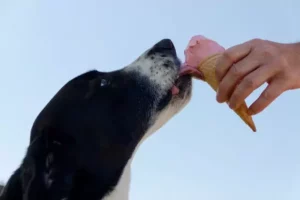0

What are some human food puppies can eat?
The majority of human foods are safe for puppies to eat, but there are a few considerations. Puppies require a diet that is low in carbs and high in protein and fat. Due to the fact that their digestive systems are still developing, they also require a diet that is very easy to digest. For these reasons, it is good to give puppies prepared diets made especially for puppies or commercial puppy chow.
Cooked chicken, turkey, or fish; cooked eggs; cottage cheese; plain yogurt; and canned pumpkin are a few human items that puppies can safely consume. Puppies can eat several fruits and vegetables in moderation, but they shouldn’t consume any grapes, raisins, onions, or garlic. Feeding table scraps to puppies can cause obesity and other health issues.

The majority of human food is safe for puppies to ingest. Carrots, apples, white rice, dairy products, fish, poultry, and peanut butter are a few healthy food choices for pups. Any food that is heavy in fat or sugar is not good for puppies because it might cause health issues.
Some forms of human food are okay for puppies to eat, but it’s crucial to conduct your homework to make sure the food is suitable for their age and size. Before introducing any new foods to your puppy, you should also take into account their food tolerance. Puppies should generally have a diet that is low in carbs and high in protein and fat.
You should not give your puppy any of the following: chocolate, caffeine, onions, garlic, grapes, raisins, milk, and other dairy products. You should also avoid giving your puppy chocolate, onions, and garlic. Methylxanthines, which are stimulants found in chocolate and are extremely poisonous, can block a dog’s metabolism. Persin, a toxin found in avocados, can be lethal to dogs. Garlic and onions can make dogs anemic.
Dogs who consume raisins and grapes risk kidney failure. Dogs who consume milk and other dairy products may get diarrhea and other digestive issues. Sugary foods and beverages can make dogs obese and prone to tooth damage. Dogs who consume caffeine may exhibit restlessness, panting, heart rhythms, and seizures.
A puppy’s diet should be high in protein, with moderate levels of fat and carbohydrates. Compared to adult dogs, puppies require more calories per pound of body weight, so their diet should contain more nutrients per serving. Puppies can benefit from eating boneless chicken, turkey, lamb, cattle, pork, or duck as well as salmon that has no bones and eggs with the shells still on for added calcium.
Although organ meats are extremely healthful, they shouldn’t normally make up more than 15% of the diet. Puppy food recommendations include carrots, blueberries, peas, and other veggies.
As long as the scrambled eggs are completely cooked, puppies can eat them. Puppies love scrambled eggs as a snack. They are a good and effective source of linoleic acid, protein, and vitamin A, which frequently helps to maintain the skin and coat in prime condition in dogs.
A homemade puppy diet ought to include the right ratios of:
Lean meat, fish, poultry, and other sources of protein.
Carbohydrates such as potatoes, pasta, and rice.
Vegetables, including carrots, green beans, and peas.
Usually in the form of vegetable oil or fat.
Bread is edible by puppies. Although it is not toxic to dogs, bread is not particularly nourishing either. A diet that is rich in protein and fat and low in carbohydrates is ideal for puppies. Puppies require a diet that will provide them with consistent energy throughout the day because they need a lot of energy to grow.
Onions, garlic, chives, chocolate, macadamia nuts, corn on the cob, avocado, artificial sweetener (xylitol), and alcohol are just a few of the foods that are harmful to dogs. Each of these substances can harm dogs’ red blood cells and/or induce gastrointestinal distress.
Due to their small tummies, puppies require more frequent feedings than adult dogs. Puppies of toy breeds require four to six meals a day for the first three months of their existence. Large-breed puppies normally need three to four meals per day, whereas medium-breed puppies only need two. Although the breed is a significant factor, there can be up to a 30% difference in metabolism and energy levels.
A high-quality, nutrient-dense meal is essential for a puppy’s healthy growth and development. A puppy’s ideal breakfast consists of a protein supply, a carbohydrate source, and some healthy fats. Oatmeal, cottage cheese, mashed bananas, and scrambled eggs are a few recommended breakfast options for pups. Additionally, puppies require a lot of clean water to drink throughout the day.
To sustain their quick growth, puppies require a diet rich in protein and fat. Both of these nutrients are abundant in eggs, which makes them a fantastic addition to your puppy’s diet. However, you should cook the eggs before giving them to your puppy since the germs in raw eggs might make your dog ill.

Dogs shouldn’t eat ice cream, of course. Since ice cream contains a lot of sugar and fat, it may be hard for dogs to digest. Additionally, some ice creams have hazardous components for dogs including xylitol and chocolate. There are numerous ice cream options that are safe for dogs if you want to give them a treat.
Dogs shouldn’t eat fries, of course. Fries have no nutritional value for dogs and are quite calorie and fat-dense. Overindulging in fries can result in weight gain and other health issues.